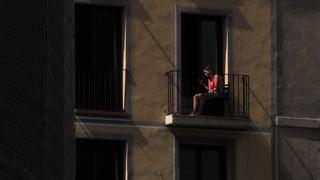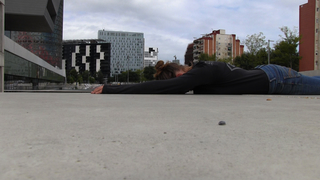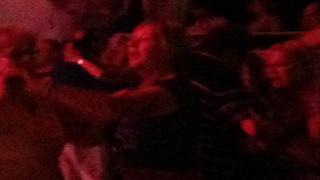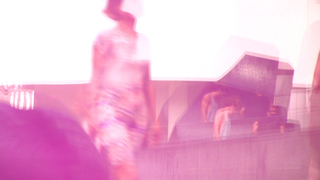Yara Haskiel
I don't write diaries I&II
Currently something came up:
http://www.loop-barcelona.com/discover/project/yara-haskiel/
See excerpt here
31:40min., split screen/ 2 channel version, 2016
I don’t write diaries: On Love and Crisis and
On the Power of Fragility
In the state of uncertainty, the connections to the people we love are becoming ever more a matter of existential urgency. Precarity that pervades our life circumstances is not just a phenomenon linked to the exploitation of labor conditions, it is also affecting and pervading our love stories and friendships.
To be in love with someone, for example, is catapulting us in a state of dizziness of desire that stimulates and changes our imagination of a possible future, but simultaneously produces and reinforces the feeling of uncertainty and fragility. On the other hand, the overly repeated notion of crisis is becoming blurred in connection to the ethics of social encounter. Different textual and visual angles in the videos reflect upon the ways of relating and belonging in the intimate context and in the context of new forms of collectivity, arising from social movements.
My video diary series titled I don’t write diaries: On Love and Crisis and On the Power of Fragility spins around a question of fragility as personal and shared experience and attempts to localize the points that trigger these experiences. The points of departure were discussions that took place within the sphere of intimate relationships, as well as the research into the contemporary philosophy dealing with the problems of uncertainty and powerlessness.
We're situated in a 'backlash' of a new 'no future' generation. Disillusionment and dissatisfaction are also triggers for becoming resistant beings. They mark a psychological moment of society, in which the precarious existence as a norm gets projected into the future. Disobedient techniques like 'dis-identification' and 'imperceptibility' are escape routes from a promise of a precarious future. Do we have to actualize a love/ care ethics in our everyday life in order to put the focus on care, commitment, trust, responsibility, respect, and care? This is a way to deal with the 'desensitization to the presence of the other', the loss of empathy in an autistic trend in the sphere of communication, where Bifo finds the roots of contemporary precariousness (‘Bifo’ Berardi, 2015). Do we have to re-think what it means to be committed, and how the existence means to depend onto one another? Finally, how to get rid of the 'I' in the singular and start thinking the 'I' as multiple (M. Garcés 2012, Tsianos, N. Stephenson, D. Papadopulos 2008, 2014; Colectivo Situaciones, 2003; b.hooks, 2001; B. Bifo, 2012/2015; Lorey 2011,2012,2014 ).
In I don't write diaries, a dialogue that touches on the worries of daily life is constantly interrupted by suggestions and visions in how to deal with these questions. Intermediate short monologues aim to expose the inner voices of the artistor to give small hints about the broader scenario that the two persons in dialogue are entangled in.
Between the lines, sometimes underneath and sometimes directly, the following questions are being raised: What role does (dis-) placement play in terms of the production of desire? How desire is produced in relation to a possible future? Where and how and with whom do we want to live? Is the social bound that we have to others the grid that supports us against the everyday exhaustion of life? How does the uncertainty produces anxieties that affect our intimate relationships? What are the ways of commitment and models of support in reference to our social-political practice and to precarious life conditions? How the position of fragility can be transformed into the position of resistance?
Live video performance in the frame of GOMENES I at the Athens Biennale, 2016
I don’t write diaries: I&II in Re-Invent Europe, group exhibition, Kunsthalle am Hamburger Platz, Berlin 2016
Lecture & screening at the The Political Imagination Laboratory, University of Perugia, 2016
I don’t write diaries: II, group exhibition, gallery BHVH Stemmer#10, Copenhagen, 2016
I don’t write diaries: On Love and Crisis I, group exhibition, gallery àngels Barcelona, 2015


produced by akademie der autodidakten BALLHAUS NAUNYNSTR
FEMALE GAZE, Performance, 50:00 min
in collaboration with Janine Jembere
The way society perceives narratives, gazes and bodies of and on post-migrant girls and young women is the point of departure of Female Gaze. The questions it focuses on are: How and why do I present myself and how am I perceived? The producers and experts of Female Gaze do not have comprehensive answers to these questions but primarily solely personal ones. In the context of a workshop they challenge wisdoms and truths and interrogate role models and preconceptions.
Using performance, film and words, the protagonists find their own self-definition in a multi-disciplinary performance. This involves relishing in the disruption of quite a few things, and also setting many things straight. Female Gaze uncovers, interrupts, disrupts and most of all makes people want to engage with post-migrant femaleness. The outcome says it all: Female Kanak Attack!
See Trailer
sounds like a pressure
an order
a false promise
an advertisement of capitalism
an affirmation of lies
nice try
let’s try
let’s get lucky
we want to sleep
we want to forget
we want to drink
let’s get lucky
I don't write diaries: On Love and Crisis, 15:00 min, Essay, 2014





JavaScript is turned off.
Please enable JavaScript to view this site properly.